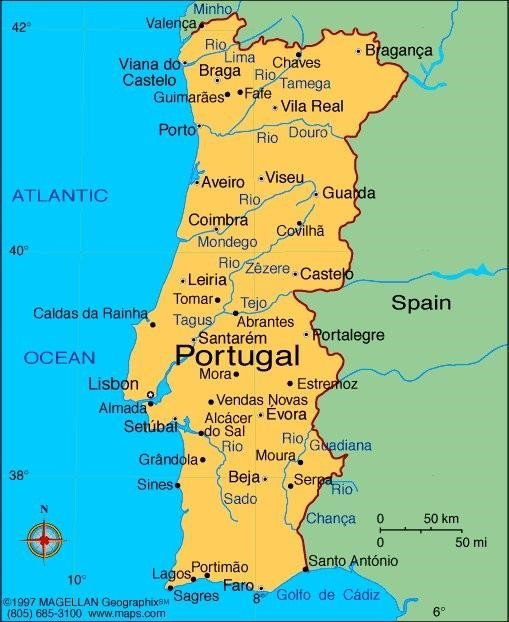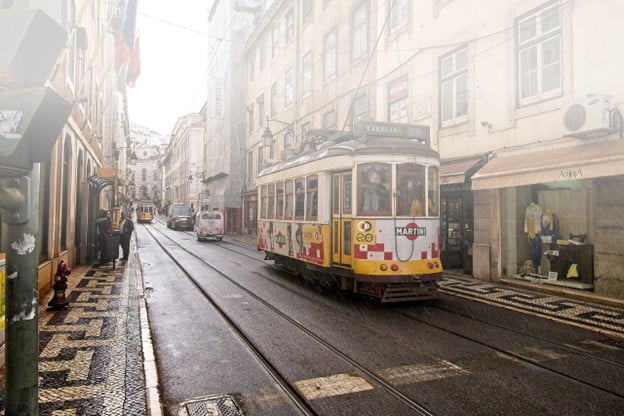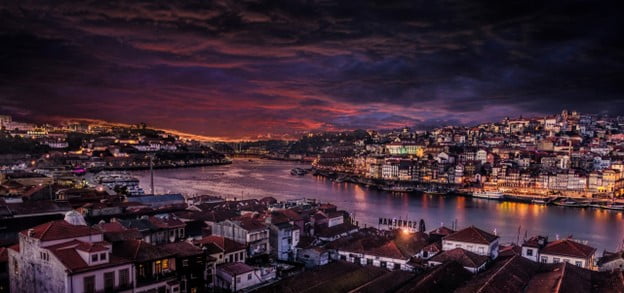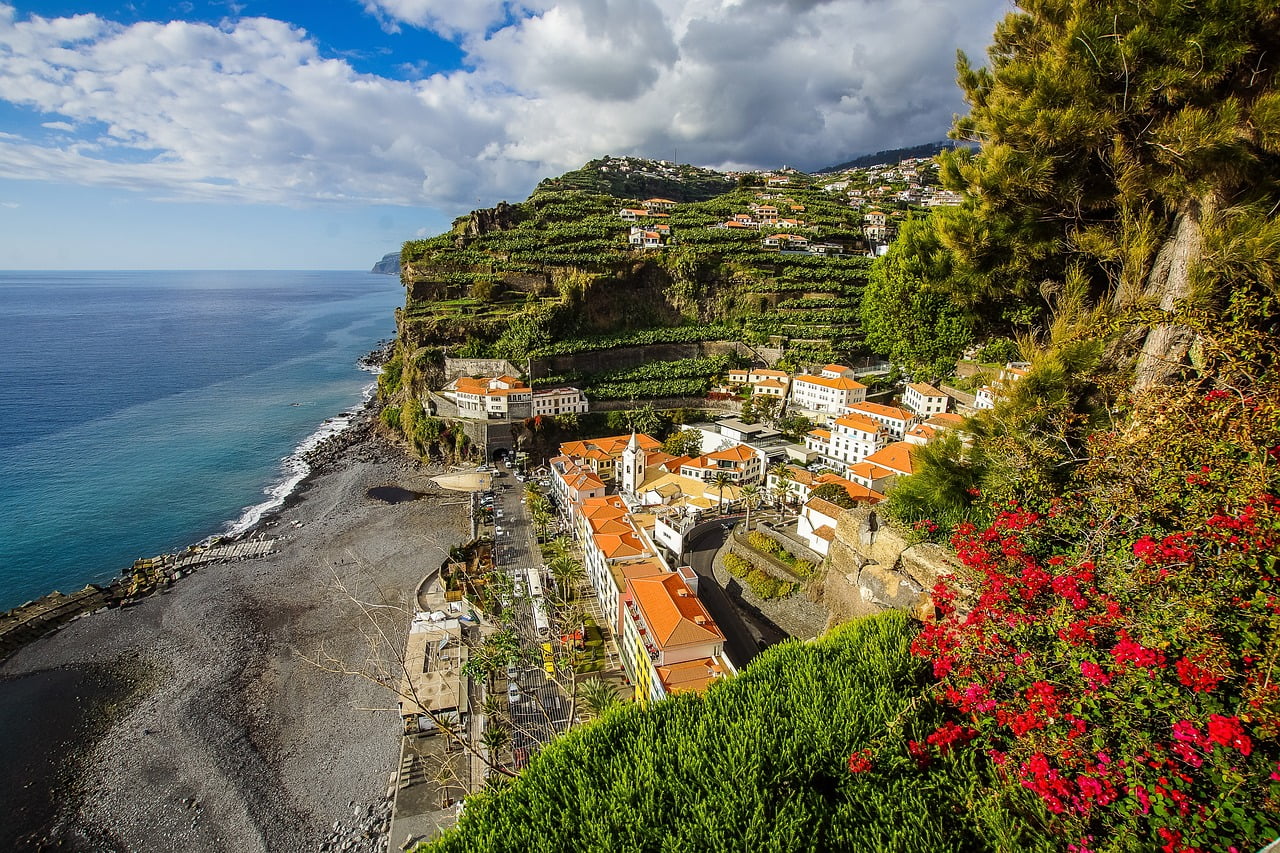Portugal is in the top ten list of the European countries that receive the most tourists and travelers. According to various reports, including one by the World Bank, the westmost European country hosts over 20 million tourists every year.
At any given time, about 20,000 foreigners report themselves on the Nomad List website as working remotely from Lisbon, the capital city. Indeed, based on the stats on Namadlist.com, Lisbon is the most popular digital nomad destination globally.
This is partly due to the deliberate steps taken by the authorities to make the country attractive to digital nomads and travelers. Having foreigners stay in the country while working for enterprises elsewhere is a welcome new source of foreign exchange, especially after the 2010 crisis that crippled the country’s economy.
Portugal also scores highly on the critical factors that digital nomads care about the most, such as cost of living, internet speed, accommodation, transportation, and security.
Table of Contents
- 1 Visa application
- 2 Cities and towns popular with digital nomads
- 3 Ponta do Sol in Madeira
- 4 Security/safety
- 5 Cultural and social norms
- 6 Political and economic stability
- 7 Language and language barriers
- 8 Health
- 9 Electronic standards
- 10 Telephone and internet plans
- 11 Population of ex-pats
- 12 Payment services and infrastructure
- 13 Transport infrastructure and services
- 14 Climate and seasons
- 15 Cuisine/food
- 16 Tax requirements on digital nomads
- 17 Common concerns

Visa application
Digital Nomads from the European Union don’t need a visa to visit or stay in Portugal. The US, UK, Canada, Australia, and New Zealand citizens are also exempted from needing to apply for a visa to enter Portugal if their stay is less than 90 days.
Visa available for digital nomads
Digital nomads can apply for a tourist visa if they intend to stay for up to three months. If they want to stay longer, they can apply for a residency visa for independent work purposes or entrepreneurs, also known as the D7 Visa.
With the D7 visa, one also has access to the Schengen Area, comprising 26 European countries
The D7 visa is valid for two years and can be renewed for three years. One is expected to apply for a residence permit within the first four months in the country.
With the D7 visa, one also has access to the Schengen Area, comprising 26 European countries.
The process of applying for a Visa
You need to fill out forms on an e-visa portal to apply for the visa. You can also get the physical forms from the nearest Portuguese embassy or consulate. After it is filled, relevant documents should be attached.
Requirements to qualify for Visa
To qualify for the visa, you need to have the following:
- Valid passport
- Monthly income exceeding €700 from your remote work.
- Travel insurance coverage
- Medical insurance coverage valid in Portugal
- Individual tax number (can be applied for remotely)
- Two recent colored passport photos
- Prove of residence in Portugal (rented or purchased).
- No criminal record in your country of origin.
The Cost of applying for a visa
You will be expected to pay between €50 to €100 for the visa, and the fee depends on factors such as your country of origin and whether you have dependents accompanying you.
Difficulty in Visa application
The difficulty in getting the D7 visa depends on your country of origin. For example, if you are from the US, UK, Canada, Australia, or New Zealand, it is easier than if you are from other parts of the world, and more so from the third world.
That is because the authorities have to be satisfied that you are not an economic migrant using a tourist or D7 visa to get to Europe and find work in local enterprises. That means they might need to interrogate the validity of your remote work more if you are not applying from the UK, US, Australia or Canada.
Cities and towns popular with digital nomads
Portugal has many urban centers that are popular with digital nomads. The most visited are the capital, Lisbon, Porto, and Madeira island. Others include Algarve, Lagos, Ericeira and Peniche.

Lisbon city

Lisbon street
Lisbon, the capital of Portugal, has a population of slightly over a half million population. The city is located on the coast of the Atlantic Ocean to the southwest of the country, and the Tegus estuary cuts through it.
The capital is one of the oldest functioning cities in Europe and the world. According to various records, the city has been around for nearly 3000 years.
Owing to its rich history and architectural evolution over time, the city offers a lot to be explored, according to Nomad List, close to 90% of the digital nomads who visit the city end up liking it.
Cost of living and Cost of living arbitrage
In general, Portugal is one of the countries with the lowest cost of living in western Europe. According to data from Numbeo, the cost of living in Lisbon is 25% lower than in Berlin, 40% lower than in London, and 30.73% lower than in Paris.
Accommodation
The options that digital nomads have while staying in Lisbon include hotels, Airbnb, apartments, and co-living spaces. Of course, hotels can be costly, especially if one plans to stay for several weeks. According to data from Nomad List, hotel rooms in Lisbon cost a median price of about $2100 a month.
If your stay is not longer than a month, then booking an Airbnb can be a better option. The cost of Airbnb is about $98 a night on average.
If you plan to stay in the city for months, consider renting an apartment. On average, a one-bedroom in the city can cost $1500 a month.
The other option for accommodation that is becoming popular with digital nomads visiting Lisbon is coliving spaces. These boarding houses and apartments are designed to cater specifically to the needs of digital nomads.
Besides providing the necessities of shelter and access to meals, they also facilitate the interaction and networking of digital nomads. Some also provide co-working spaces and all the facilities a digital nomad needs to deliver for their clients.
The most popular co-living spaces in Lisbon include:
Utilities
For a one-bedroom apartment, you are likely to pay between €100-150 for water, gas, electricity, and bins.
Groceries
In general, the prices of groceries are about 60% of what they will cost you in the US or the UK. A loaf of bread costs €1.22, a kilogram of banana €1.22, and a half litter bottle of beer €1.09.
Internet
Like most other cities in Portugal, Lisbon has a very reliable internet connection. The average internet speed is about 30Mbps. There is free WiFi in most hotel rooms, apartments, and co-living spaces, as well as in most public spaces such as restaurants, cafes, and even public parks.
Best coworking spaces
Lisbon is one of the cities in the world with the highest number of co-working spaces. The list of major ones within the city and its environs exceeds 50. It is important to point out that some co-working spaces are co-living spaces.
Lisbon is one of the cities in the world with the highest number of co-working spaces
According to data from Nomad List, the average monthly charge for a desk and common facilities in a coworking space in Lisbon is $234. Besides providing a desk, free internet, and office appliances, the spaces are also places where digital nomads can meet and network.
Most of these spaces also organize events around entrepreneurship and technology.
Some of the most popular coworking spaces in Lisbon include:
- Avila Spaces – Business Center & Coworking
- Resvés Cowork Space
- Outsite Lisbon – Cais do Sodre
- IDEA Spaces – Parque das Nações
- Lisbon WorkHub
Crypto Community
Portugal does not tax gains made from selling cryptocurrencies. It has also largely remained indifferent as far as the use of crypto is concerned. This has made the country attractive to crypto enthusiasts and startups.
There is a huge crypto community in Lisbon and several organized groups of bitcoin enthusiasts. The list includes a coworking space called The Block, where crypto enthusiasts meet to work, network, and attend events.
Blockchain Center Portugal is also a meetup group for anyone interested in cryptocurrency-related technologies and innovations. The city has hosted several international crypto events, including the Crypto Art Festival in May 2021 and the planned WebSummit in November 2023.
According to data from CoinATMradar.com, there are about four crypto ATMs within the city.
Digital nomad communities
Indeed, Lisbon has one of the biggest digital nomad communities in Europe and the world. On average, according to numbers from Nomad List, over 18000 digital nomads are living and visiting the city. As a result, one can interact and network with people from all over the world in the city.
Local nomad job opportunity
The digital nomad visa does allow one to accept jobs from Portuguese businesses. Given that digital nomads network in the co-living and co-working spaces and events organized in the city, one will likely find clients who need the services they offer.
Using platforms like Nomad List, you can discover jobs you can apply to and be hired to work on while living in Lisbon.
Popular recreational activities and fun spots
While in Lisbon, there are many things you can do for fun. You can explore the city and marvel at the architecture. Some of the buildings are thousands of years old.
At night you can be a guest at any of the many nightclubs and sample the wide collection of Portuguese wine and beer. The most popular clubs in Lisbon include Casa Independente, Incógnito, and Titanic Sur Mer.
It is important to note that Lisbon is a coastal city with an estuary, and many beautiful beaches and aquatic nature parks surround it. In the summer, the beaches are the places to be. Besides basking in the sun, one can surf or take boat rides.
If you are tired of the city, you can take breaks and visit the nearby rural towns and villages. You can explore ancient churches, wineries, and farms. You can also take a boat and watch numerous aquatic birds, in particular flamingoes, in the Estuário do Tejo Nature Reserve.
Porto city

Porto city
Porto is significantly cheaper than the capital, Lisbon. According to data from Numbeo, Consumer Prices in Porto are 19.18% lower than in Lisbon. Meanwhile, accommodation costs are 43.41% lower in Porto
This is the second largest city in Portugal and has a population of about 215000. It is a popular city with about 3500 digital nomads indicating on Nomad List to be in the city anytime.
In 2020, the luxury travel magazine Condé Nast Traveller listed Porto among the world’s top 50 most beautiful cities.
Cost of living
Porto is significantly cheaper than the capital, Lisbon. According to data from Numbeo, Consumer Prices in Porto are 19.18% lower than in Lisbon. Meanwhile, accommodation costs are 43.41% lower in Porto.
Restaurant Prices in Lisbon are 31.60% higher than in Porto. Groceries Prices in Lisbon are 6.64% higher than in Porto. Meanwhile, the local Purchasing Power in Lisbon is 2.59% lower than in Porto.
According to data from Nomad List, you need an average of about $3000 to cover your stay in the city for a month.
Transportation
An international airport, the Francisco Sa Carneiro Airport, serves the city. It also has a great road and railway network. You can use taxis, trams, metro, and buses to move into the city.
Public Transport cost
The main public transport in Porto is serviced through trams, buses, and the metro. The same organization manages the three public transport modes, so you buy the same ticket online.
You can buy a ticket for a single route for a price of €0.50 or one for all routes for 24 hours at the price of about €9.
Private Transport cost
Within the city, you can use the Uber and Bolt hailing apps. You also have the option of renting a car and driving yourself around. The cost of renting a car ranges between €10 and €100 a day, depending on the type of car, size, and condition.
Accommodation
Like in Lisbon, you can stay in a hotel room, Airbnb, apartment, or a digital nomad co-living facility. According to data from Nomad List, the average fee for a hotel room in the city is $86 a night. Meanwhile, the monthly Airbnb median price is $2244.
The co-living spaces charge between $40 (for the dorms) and $500 (for the private ensuite rooms). The most popular digital nomad coliving spaces in Porto are Selina, Outsite, and Coliving House in Bonfim.
Internet
The average Internet speed in Porto is 35Mbps. Most hotels, Airbnbs, apartments, and coliving spaces provide free wifi. For a price of about €10, you can get a prepaid mobile plan with up to 30 GB of data.
Best coworking spaces
Like it is the case in Lisbon, digital nomads have a long list of coworking spaces to choose from while in Porto. The list includes Synergy Porto, CRU Hub, and Selina Navis.
According to data from Nomad List, the medium price charged by coworking spaces for a hot desk is $287.
Crypto Community
While not the same size as the one in Lisbon, Porto has a thriving crypto community. One of the places crypto enthusiasts meet to discuss trends, network, and build projects using blockchain technology is the Blockchain Center Portugal.
The city does host a few international crypto events, including the Porto Blockchain Conference.
According to data from CoinATMradar, there are about two crypto ATMs in the city of Porto.
Nomad Expat Community
There is a significant population of digital nomads in the city at any particular time. On Nomad List, over three thousand individuals register to be in the city. This size of the digital nomads in town creates the right environment for networking.
Local nomad job opportunity
Besides opportunities to work for local businesses in Porto and other parts of the country, one is also likely to get assignments from fellow digital nomads.
Popular recreational activities and fun spots
Porto is a coastal city with a major river cutting through it, just like Lisbon. Indeed, most of the activities that one can engage in while in the capital, they can partake in Porto. In addition, one can visit the nearby Peneda Generes national park and the Douro valley to explore wineries.
Ponta do Sol in Madeira

The Ponta do Sol.
Ponta do Sol is a village on the rocky southern edge of Madeira, an island in the Atlantic ocean 600 miles southwest of the mainland. The government has customized the village, installing high-speed, reliable internet and providing intensive security to serve digital nomads. It has apartments, coliving spaces, coworking spaces, and conference rooms.
“The average monthly cost a digital nomad can incur living in the village and on the island is about $2076”
According to data from Nomad List, the average total monthly cost a digital nomad can incur living in the village and on the island is $2076. A one-bedroom studio costs, on average, $588 a month, and a dinner for one person is $6.86.
Security/safety
In general, Portugal as a country is very peaceful. Indeed, Portugal has been ranked the 6th most peaceful country in the world. Besides the extremely low crime rate, Portuguese society is tolerant and accommodating to people from other cultures and the LQBTQ community.
The crime rate, especially among expatriates
The crime rate in Portugal is significantly low. Indeed, robberies, home breaking, and physical attacks happen at quite nominal rates. You can take walks at night in most cities and towns, including Lisbon and Porto, without worrying too much about your safety.
Nevertheless, in crowded areas, especially in Lisbon and Porto, you might experience pickpocketing and purse snatching.
It is important to point out that as more people from other parts of the world make Portugal home, the effect on security can be felt.
Indeed a recent report has shown that 2021 experienced the highest increase in crime in decades. Even though the change is still insignificant, that means as a digital nomad or traveler, you should give some thought to your security and safety.
Dos and don’ts
- Avoid involvement with individuals likely to be involved with crime, including gang activity.
- Keep your valuables secure when in crowded public spaces such as beaches.
- When out at night, be in the company of people you know and trust.
- Familiarize yourself with emergency numbers you can call for help, starting with 112.
Portugal is a cultural contradiction. On the one hand, it is a majorly open society with the mantra of live and let’s live prevailing. On the other hand, it is a highly conservative society, especially in comparison to the rest of the western world.
Religious composition
The country has a significant influence from the Catholic church, with up to 80% of the citizenry professing the faith.
How you might be expected to behave
To a large extent, Portugal, especially in the cities and major towns, is a place where you are free to be yourself.
Nevertheless, there are local ways of life. Indeed, while the cities and towns are vacation destinations, to the locals, it is their home. Therefore, many might expect you to behave in a particular way.
Cultural dos and don’ts
- Dress modestly, especially when in formal settings
- Be respectful and polite in your speech and actions toward others
- Show respect to the religious faith of the population.
- Avoid political and sensitive historical topics such as Portuguese colonial wars in your conversations with locals.
- Avoid self-aggrandizing. It sends wrong signals to those around you.
- Locals carry gifts such as flowers or a bottle of wine when visiting homes.
- Give respect to the elderly
Political and economic stability
Portugal is a highly developed society with complex political, economic and social structures that have evolved for thousands of years.
The nature of politics and government
Portugal is a republic with the president as the head of state. The president is elected every five years and is responsible for appointing a prime minister who becomes the head of government.
Economic indicators
Portugal is a high-income country. It has an income per Capita of about $32500, which is more than double the global average.
The economic position of Portugal is unique, especially compared to most of the other destinations for digital nomads. While highly developed, it offers opportunities for cost of living arbitrage, especially for digital nomads from North America and the rest of western Europe. The cost of living is up to 40% less in Portugal compared to many other developed countries.
Language and language barriers
The official and national language are Portuguese. Nevertheless, over 50% of the population, especially in major cities such as Lisbon and Porto, can communicate in English, which makes it easy for digital Nomads to interact and transact.
Indeed, in most coliving and co-working spaces, as well as other places frequented by foreigners, English tends to be one of the primary languages used.
Other languages are spoken widely
Besides Portuguese and English, many in the country can also speak Spanish, Germany, French, and other European languages. In the North Eastern part of the country, the local population speaks a language known as Mirandese.
Health
Regarding health, Portugal is generally a very safe country, with a low risk of catching infectious diseases or those transmitted through parasites.
Indeed, according to a report by the European Commission, life expectancy in Portugal is higher than the EU average and increased by more than five years between 2000 and 2019.
Common infectious diseases
While the country is generally not prone to airborne or parasite-transmitted diseases, it has recorded a notable amount of tuberculosis cases. The country is ranked 8th on the list of countries with the highest reported cases of TB in Europe.
While it has low prevalence rates, it is possible to get infected with sexually transmitted diseases if you do not take the necessary steps to protect yourself.
How to protect yourself from common diseases
You don’t have to do more than what you do to protect yourself from catching TB.
Of course, you should exercise regularly and check your diet to prevent lifestyle diseases such as heart attacks. Fortunately, gyms are common in most urban centers in Portugal, and you can easily find those near you. Indeed, most apartment complexes and coliving spaces have them as part of their offer.
Clinics vs. Hospitals (count)
In total, there are over 200 hospitals in Portugal.
The doctor-per-patient ratio is also one of the highest in the world. There are 342 doctors for every 100,000 people, putting Portugal in the top thirty countries with the highest doctor-patient ratio.
Health Insurance
Before applying for the D7 visa, you must have valid medical insurance coverage in Portugal. You can take one in your country of origin that can work in Portugal.
You also have the option of buying a policy from one of the service providers in the country. You need to have a residence permit before qualifying for this option.
You can also take coverage from solutions specifically designed for digital Nomads, such as World Nomads and SafetyWing. The other option is to take the ex-pat medical insurance.
Health care quality
Portugal boasts of a highly developed healthcare system.
Several of the hospitals in the country rank highly globally. For example, Centro Hospitalar de Lisboa Central (Hospital Dona Estefania) was ranked 189th in the world. The country’s second-best ranked country is Centro Hospitalar do Porto (Hospital Geral de Santo Antonio), at the global position of 304th.
Vaccination
The CDC recommends that before you visit Portugal, you need to get the following:
- Chickenpox (Varicella)
- Diphtheria-Tetanus-Pertussis
- Flu (influenza)
- Measles-Mumps-Rubella (MMR)
- Polio
- Shingles
- Hepatitis A
- Hepatitis B
Electronic standards
The mobile service providers in Portugal support only GSM-enabled mobile phones. The simple way to tell the difference between GSM and CDMA is that the former has a SIM card slot, and the latter does not.
The standard voltage in Portugal is 230 for a single phase and 400v for a three-phase. The Frequency of the power supply is 50 Hz (Hertz). The standard plug outlet used is type F.
Telephone and internet plans
The three primary mobile network service providers in Portugal are MEO, NOS, and Vodafone.
How to register for a Sim card
You can buy a sim card at the airport or a nearby service provider’s store. You can use Google maps to locate the one near where you stay. Before settling on a particular sim card, request the person selling to explain the plans it supports and give you any other relevant information.
Mobile phone plans and cost
MEO’s Ready to Enjoy eSIM is a prepaid plan popular with travelers. It costs $19, and you get 30 GB of data besides the airtime.
Population of ex-pats
Portugal is in the top ten list of most visited countries in Europe. Over 10% of the population in Lisbon and Porto is made up of foreigners in the country as tourists, digital nomads, retirees, ex-pats, entrepreneurs, and investors. This creates the right environment for networking.
Payment services and infrastructure
The financial system is highly developed in Portugal. You can access most current payment services, including those built on financial technology.
Nevertheless, payment cards are still very popular in Portugal. According to data provided by the central bank of Portugal (Banco de Portugal), 86.5% of the total transactions in the country are settled using payment cards.
Popular domestic payment services
The most popular payment method in Portugal is Multibanco, a debit card on the largest interbank network in the country. It takes a 30% share of the payments market.
Multibanco offers more functionality and services than standard ATM cards, including paying bills, invoices, prepaid mobile phone top-ups, and show-ticket purchases. The payment service can also be accessed through mobile and the internet.
It is possible to transfer funds between your Multibanco account and your PayPal wallet.
Another popular local payment card is Maestro.
Accessible international payment services
With a Visa or Mastercard debit or credit card, you are okay for the most part.
You can open a local bank account as a country resident under the digital nomad visa.
Currencies and exchange rates
As a European Union member, Portugal has the Euro as its official legal tender currency. Payments and debt settlements have to be primarily done using this currency.
When you arrive in the country, you can convert the money you need through the local bureau de change or withdraw from the ATM using a visa or Mastercard.
Meanwhile, buying and selling crypto in the country is not restricted, but it is also not subject to any form of taxation.
While most merchants do not accept crypto for payment, you will be fine using a crypto debit card, especially one with a Euro bank account as part of the offer, such as the Clubswan card.
Transport infrastructure and services
The transport system in Portugal is highly developed and also efficient. You can use buses, trams, trains, taxis, and buses in cities. You must buy the tickets online to use buses, trams, and trains in cities like Lisbon and Porto.
Taxi-hailing apps work in major cities and towns in Portugal. The most popular apps are Uber, Bolt, and Free Now. Besides getting a driver to give you a ride, you can also rent a scooter using the apps.
When commuting along Tejo Estuary in Lisbon, between cities on the Atlantic ocean coastline, or into and out of islands, in particular Madeira, you can use the ferry, cruise, or boat service.
You can hire a car if you are comfortable driving and have a valid driving license. It can cost you anything from $10 to $100 a day, depending on factors such as the model, size, and condition of the car.
Climate and seasons
The general climate of Portugal is the Mediterranean. It is neither too hot nor too cold throughout the year.
The North West parts of the country are generally rainier than the southeast. The most rain falls in November and December.
Portugal is in the sunniest part of Europe alongside Spain and the islands in the mediterranean sea.
Portugal gets between 2500 to 3200 hours of sunshine annually. Indeed, the country receives the most sunshine in Europe.
The hottest and most sunny days are between June and August. In July, the average temperature during the day is 30 °C, and during the night, 22 °C.
With a high of 47.4°C often recorded in summer, the town of Amareleja is one of the hottest places in Europe.
The coolest days of the year are generally in February. The temperatures reach 16°C during the day and drop to about ten °C at night.
Cuisine/food
The meat component of Portuguese cuisine primarily includes beef, pork, and poultry. With a long coastal line and many rivers flowing through the country, the Portuguese people also eat a lot of seafood, specifically fish, crabs, lobster, shrimps, octopus, prawns, and mollusks.
Rice, potatoes, vegetables, and legumes form another part of their cuisine. The Portuguese also eat a lot of bread, in particular broa. They also like their food spiced.
Because of the huge population of people from different parts of the world, restaurants, especially in the major cities, offer cuisines from other parts of the world.
It is important to point out that it is illegal in Portugal for a restaurant not to provide vegan meal options
Tax requirements on digital nomads
Indeed, one of the requirements to qualify for the D-7 visa is to get a personal tax number. Digital nomads staying in Portugal are expected to pay a tax of 20%. However, this is only on the income they generate while residing in the country.
Whatever amount they generate in the time they travel outside the country is not subject to taxation in Portugal. For this to be the case, however, one should obtain an NHR (non-habitual resident) status, which is possible after staying in the country for at least 183 days in the previous year.
Meanwhile, Portugal does not tax any gains from trading crypto and other digital assets.
Common concerns
- Too expensive
- Gets cold in the winter
- Feels crowded
- Many people smoke tobacco
Nevertheless, safety, fast internet, favorable summer climates, interesting destinations, great transport and accommodation infrastructure, and networking opportunities outweigh these concerns.
Club Swan Disclaimer: The information provided is not tax and/or legal advice. The statements do not constitute legally binding offers. The company does not guarantee or endorse any third-party links, websites, or goods and/or services. Seek your own professional advice.




